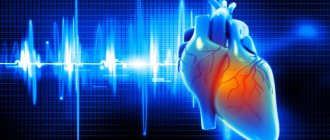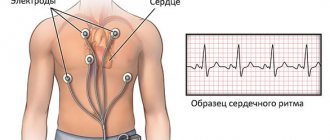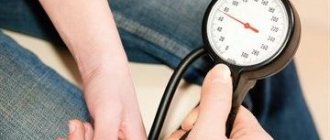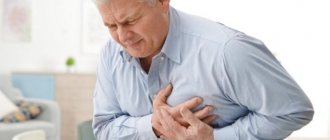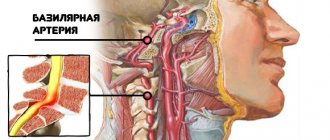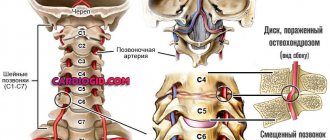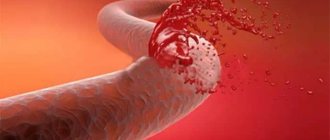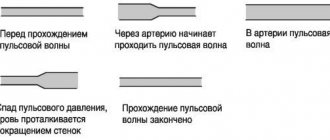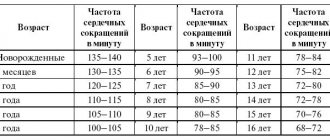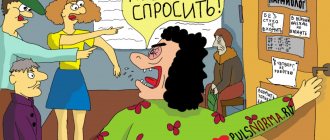Pulse fluctuations have physiological and pathological causes. In the first case, an increase in heart rate can be triggered by emotional and physical stress, drinking large amounts of coffee or energy drinks, a hangover, general fatigue, and sleepless nights.
Pathological causes are more extensive - from cancer to infectious processes with a latent course. Therefore, you need to consult a doctor for diagnosis if pulse surges occur regularly and other symptoms such as dizziness, increased blood pressure, and hand tremors are present.
If the pulse fluctuates between 50-110 beats per minute during the day, then this is a clear confirmation of tachycardia of pathological origin, and this condition is fraught with strokes and heart attacks.
Pulse jumps: causes in adults
The most common causes of pulse surges in adults are physiological factors:
- excessive stress on the body associated with work, inadequate night rest;
- overeating, especially when fatty foods and any “heavy” foods such as kebabs and salted fish were consumed;
- psycho-emotional disorders, frequent experiences;
- excessive physical activity.
In addition, fluctuations in heart rate may be present in those people who drink energy drinks, drink large quantities of coffee and strong tea. Uneven heart rate is characteristic of hangover syndrome.
All these conditions are not dangerous and do not require any specific treatment. But if the pulse jumps from 50 to 110 beats per minute, and this happens several times during the day, there are symptoms of a clear deterioration in health (nausea, headache, trembling of the upper limbs, and so on), then you need to contact a cardiologist for diagnosis - these are signs tachycardia, which can be caused by various pathologies.
Why does a teenager's pulse fluctuate?
In adolescence, the pulse fluctuates almost every day, and not only against the background of physical activity and any emotional experiences, often the causes of a rapid pulse are:
- active growth of the body - puberty is characterized by uneven growth of muscles, bones and blood vessels;
- hormonal changes in the body - too active production of hormones necessarily affects the heart rate, and the vessels are simply not able to cope with the sudden surge of blood;
- strain on the organs of vision – we are talking about long periods of time at the computer or on the phone.
If pulse fluctuations do not occur regularly, the frequency quickly normalizes, there are no chest pains or headaches, nausea, tremors (trembling) of the limbs, decrease/increase in body temperature, then parents and the teenager himself do not have to worry - this is how the period of active maturation of the body manifests itself.
Heart conduction disorders (blocks)
Conduction disorders, particularly blockages, can disrupt the conduction of electrical signals. This disorder affects the rhythm and frequency of the heartbeat, and as a result, the heart cannot pump the amount of blood necessary for the body to function.
Cardiac conduction disorders can manifest as the following symptoms:
- fatigue
- dizziness
- slow heartbeat
- dyspnea
- cardiopalmus
- chest pain
- abdominal pain
- nausea
- fainting
Treatment will depend on the type of blockade and may include medications such as atropine, glycopyrrolate or antiarrhythmic drugs, or surgery such as a pacemaker.
A sharp jump in blood pressure and pulse: reasons
If, simultaneously with a surge in blood pressure, an increase in blood pressure occurs, this is most often a sign of tachycardia. It may be present on a daily basis or appear from time to time; in any case, consultation with a cardiologist is required, because this condition is provoked by pathologies:
- cervical osteochondrosis;
- low level of hemoglobin in the blood (anemia);
- lack of potassium and magnesium in the body;
- cardiac ischemia;
- disorders of the thyroid gland.
It is interesting that the listed pathologies in the initial stage of their development are practically asymptomatic and surges in pressure/pulse are the only sign.
What causes your heart rate to fluctuate at rest?
If your heart rate fluctuates at rest, you need to pay attention to the following factors:
- age of the person - in the elderly, an increase in heart rate is considered normal if it is not accompanied by pain and shortness of breath;
- ambient temperature - if it is high, then vasodilation will certainly lead to an increase in heart rate, thus the body simply cools down;
- lack of fluid in the body - banal dehydration makes the blood thick, reduces the amount of plasma, and the heart has to work with redoubled force to maintain blood circulation;
- stressful situations - even at rest a person is able to worry, remember, look for solutions to problems and an increase in heart rate against the background of stress is also possible;
- excessive physical activity - if a person is specifically involved in sports and his pulse increases at rest, then he needs to either reduce the time of training and its intensity, or increase the rest time between them;
- emotional state - even slight excitement automatically leads to an increase in heart rate.
The listed factors relate to the physiological causes of pulse fluctuations at rest; they are quite easy to correct.
But if, against the background of the main symptom, a person is bothered by headaches, a feeling of pressure in the chest (the anatomical location of the heart), periodic increases in blood pressure, and dizziness, then it is worthwhile to undergo examination by a cardiologist. It is possible that pathologies such as microinfarction, heart failure, malignant neoplasms, infectious or inflammatory processes will be diagnosed - they may occur for some time without pronounced characteristic symptoms.
Dehydration
If a person does not drink enough water, they may become dehydrated. Dehydration can affect a person's mental and physical functioning, including heart rate. According to a 2021 review, some immediate symptoms of dehydration may include:
- decreased physical activity
- decreased thinking ability
- mood change
- fatigue
In the short term, dehydration can cause your heart rate to increase due to the following reasons:
- affects the function of the endothelium, which lines the inner wall of the heart and blood vessels;
- affects the sympathetic nervous system, causing changes in breathing and heart rate;
- affects the body's ability to regulate blood pressure. The person feels dizzy when standing up.
If a person is dehydrated for a long period of time, their risk of developing problems such as heart disease increases.
Apart from drinking water, a person can consume a lot of fruits and vegetables. If symptoms of dehydration occur, oral rehydration solutions can quickly restore electrolyte balance. If the above methods do not help and the symptoms become more severe, intravenous fluid administration is necessary.
Blood pressure and pulse jump: reasons
If the pulse periodically quickens or slows down against the background of a decrease/increase in blood pressure, then the causes of this condition may be:
- myocarditis;
- malignant neoplasms;
- infectious diseases;
- hyperthyroidism (thyroid disease);
- heart defects;
- pathological changes in the upper chamber of the heart;
- obesity 2-3 degrees;
- pulmonary or heart failure;
- benign tumors;
- cardiac ischemia.
The listed conditions are exclusively pathological in nature; they require long-term and targeted treatment.
Medicines
Some drugs can affect your heart rate and may cause abnormal heart rate. Some types of medications that can cause tachycardia:
- anesthetics
- antiarrhythmic drugs
- antibiotics
- antitumor drugs
- antidepressants
- thyroid hormone medications
- stimulant drugs
A person with atrial fibrillation should be careful when taking the following medications, such as:
- Antiarrhythmic drugs, including: adenosine
- amiodarone
- flecainide
- propafenone
What are the dangers of sudden increases in heart rate?
Sudden changes in heart rate are dangerous because in this state the heart works at an increased rate, the blood vessels dilate greatly and then suddenly narrow. And if this happens regularly, the result will be:
- decreased heart function;
- stretching of the walls of blood vessels, reducing their elasticity;
- lack of oxygen;
- death of heart muscle cells;
- incomplete filling of the ventricles of the heart with blood;
- increase in heart size.
In people with sharp increases in pulse rate, acute myocardial infarction is often diagnosed, which in the absence of resuscitation care often leads to death.
Symptoms of change
Symptoms of pulse surges that occur for physiological reasons will only be a rapid heartbeat and a feeling of anxiety inside. They pass quickly, and the person manages to calm down on his own and get his pulse readings in order. But the signs of a pathological jump in pulse will be:
- pain in the sternum of varying intensity;
- dizziness;
- shortness of breath, feeling of lack of oxygen, inability to take a deep breath;
- clouding of consciousness, up to short-term fainting;
- general severe weakness;
- trembling (tremor) of the upper and lower extremities;
- a sharp increase in body temperature.
The listed symptoms, even if only one of them is troubling, indicate a pathological origin of pulse surges.
When to see a doctor
If your heart rate and rhythm become irregular or cause alarming symptoms, it is important to seek medical help. Even if there is no danger, your doctor can help reduce the risk of complications. If you notice the following symptoms, you should call emergency help:
- chest pain
- dyspnea
- dizziness
- feeling of impending doom
- pain in the following places: neck
- one or both hands
- jaw
- stomach area
Prevention measures
Preventive measures aimed at stabilizing the heart rate will “work” only if they are followed on a regular basis:
- Lose weight - obesity is considered a direct danger to the heart and blood vessels. You need to adjust your diet and regimen, refuse or reduce the amount of fatty, smoked, salty foods and desserts/sweets you consume. You can’t start losing weight suddenly by following some strict diets - this will only worsen the situation, and there will be no results. The best option is to seek help from a nutritionist.
- To refuse from bad habits. We are talking not only about smoking and drinking alcoholic beverages, but also about drinking coffee at night, excessive consumption of drinks with caffeine - these include energy drinks.
- Give your body regular physical activity. Doctors constantly emphasize that in trained people the pulse slows down, and this indicates the strength of the entire cardiovascular system. There is no need to engage in professional sports; even regular walking and simple morning exercises will be useful.
Jumps in pulse and blood pressure may be physiological in nature, but often they are the only symptoms of the development of serious pathological conditions. If your heart rate increases regularly, you should contact a cardiologist for examination, because the lack of qualified medical care can lead to heart attacks and strokes, coronary heart disease and myocarditis.
Stress
The interaction between the heart and brain causes the body to respond to certain emotions, such as anger, depressed mood and stress. According to a 2014 article, negative emotions cause disproportionately more activity in the right hemisphere of the brain. To explain this, the heart must change the way it beats, causing disproportionate or extra beats. This makes the electrical signals unstable and, as a result, can cause arrhythmia.
Stress can manifest itself in a range of physical and mental symptoms, including:
- anxiety
- feeling depressed
- headache
- cardiopalmus
- nausea
- fatigue
- insomnia
Stress management can be important in reducing the risk of developing arrhythmia. Stress reduction and relaxation techniques, such as meditation, can be effective forms of treatment.
